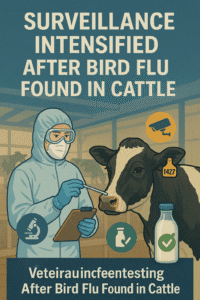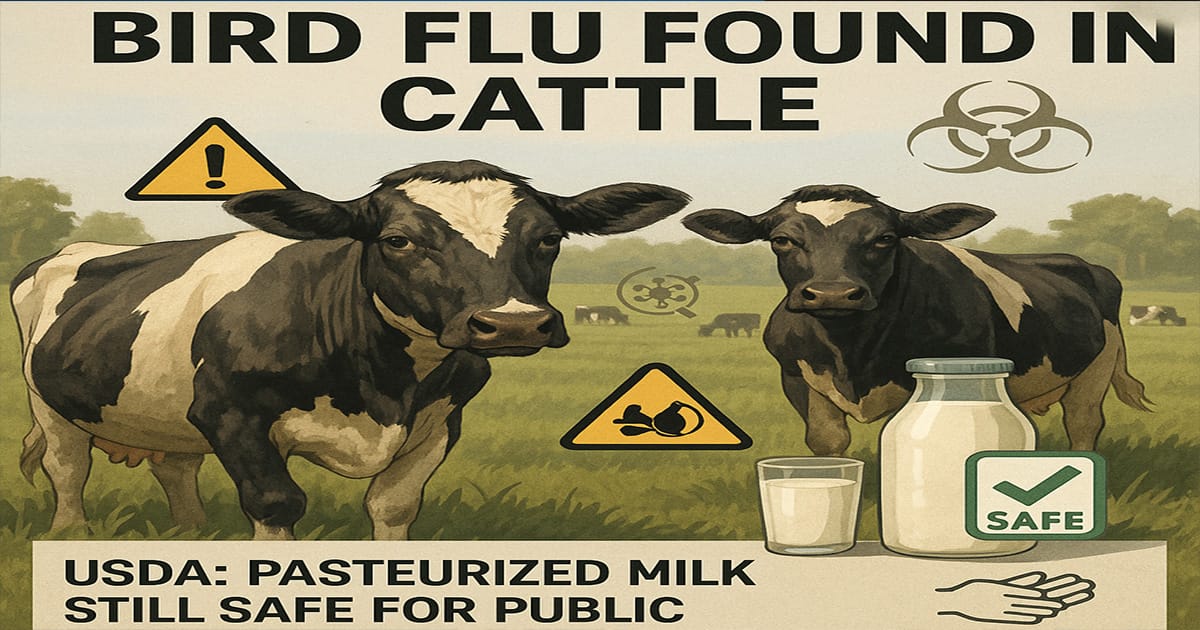Bird Flu Found in Cattle across several U.S. states, with the H5N1 virus confirmed in dairy cows.
Health officials in the United States have confirmed the presence of the H5N1 bird flu virus in dairy cattle across multiple states, marking a rare occurrence of avian influenza affecting livestock. According to the USDA and CDC, several herds have tested positive, though no human infections have been reported to date. Authorities have stressed that pasteurized milk remains safe for public consumption, as there is no evidence of the virus being transmitted through processed dairy products.
Bird Flu Found in Cattle has triggered heightened surveillance and testing in affected regions, along with increased biosecurity measures on farms. Consumers are being advised to avoid raw, unpasteurized milk as a precautionary step. While the discovery has raised concerns, the government has not issued any product recalls, and the national milk supply remains steady. Experts continue to monitor the situation closely, aiming to contain the outbreak and ensure public health safety.
Dozens of cows have tested positive so far, but no human infections have been reported.
The U.S. Department of Agriculture (USDA) has confirmed the presence of the H5N1 bird flu virus in dairy cattle across multiple states, prompting health agencies to intensify testing and containment efforts. This marks the first major instance of avian influenza spreading among livestock in the country, raising questions about its impact on food safety and animal health. Dozens of cows have tested positive so far, but no human infections have been reported, according to USDA and CDC updates. Authorities emphasize that pasteurized milk remains safe for consumption, as there is no evidence of virus transmission through treated dairy products.


Farmers in affected regions have been urged to follow strict biosecurity protocols, while raw milk consumption is being discouraged as a precautionary measure. Surveillance has been increased nationwide, with veterinary teams monitoring herds for symptoms. Bird Flu Found in Cattle has triggered both scientific attention and public concern, though officials continue to reassure consumers that the overall milk supply is unaffected. So far, no dairy recalls have been issued, and distribution remains normal. As the situation evolves, government agencies remain on high alert, determined to prevent further spread. Efforts are underway to fully understand how Bird Flu Virus in U.S. Cattle and what risks, if any, it poses to human health.
The USDA and CDC have stated that there is no evidence of transmission through milk.
Health authorities in the United States are working closely to address concerns following the detection of the H5N1 bird flu virus in dairy cattle. Despite the confirmed cases in livestock, public health officials have reassured consumers that the nation’s milk supply remains safe. The USDA and CDC have stated that there is no evidence of transmission through milk, particularly when it is pasteurized. Officials highlighted that pasteurization effectively eliminates dangerous microbes, including the H5N1 virus, ensuring the safety of processed milk.
As a precaution, the public is being advised to avoid raw milk, which could carry other health risks. Enhanced monitoring and testing of dairy herds continue in affected regions, and no human infections have been reported so far. No dairy recalls have been issued, and milk distribution remains unaffected. Health officials continue to assess the situation and communicate updates as needed. The current response is part of broader efforts to manage the outbreak of Bird Flu Virus in U.S. Cattle.
Surveillance and testing efforts have been intensified in affected regions.
In response to the detection of the H5N1 bird flu virus in dairy cattle, U.S. health authorities have significantly ramped up surveillance and testing operations in affected regions. Veterinary teams, along with state and federal agencies, are actively monitoring herds for symptoms of infection. On-site inspections, laboratory testing, and sample collection have increased to help identify potential hotspots and contain further spread. Officials aim to detect new cases early and ensure timely intervention to protect both animal and public health.
These measures are also being used to reassure consumers that strict monitoring is in place. Farms with confirmed or suspected cases are under close observation, with movement restrictions applied where necessary. According to officials, this intensified surveillance is a key component of the government’s containment strategy, allowing them to track the virus closely while maintaining control over milk safety and livestock health.


Pasteurized milk is safe, but the public is advised to avoid raw milk as a precaution.
In light of the recent detection of the H5N1 bird flu virus in dairy cattle, health authorities have issued clear guidance regarding milk safety. According to the USDA and CDC, pasteurized milk is considered completely safe for consumption. The pasteurization process involves heating milk to a specific temperature to kill harmful pathogens, including viruses like H5N1, ensuring that dairy products reaching consumers are free from infection risks. So far, no evidence has shown that the bird flu virus can survive the pasteurization process or be transmitted through properly treated milk.
However, the public is strongly advised to avoid raw or unpasteurized milk, which may carry not only the risk of bird flu but also other dangerous bacteria such as Salmonella and E. coli. Health experts stress that while the virus has been found in cattle, the safety of the milk supply remains intact—provided consumers follow official recommendations and avoid unprocessed dairy products during this period of heightened surveillance.
Government Issues Advisory to Dairy Sector Amid Bird Flu Detection in Cattle
In the wake of Bird Flu Found in Cattle across multiple U.S. states, federal authorities have issued an urgent advisory to the dairy industry. The government has urged farmers and the dairy sector to exercise caution and strictly follow safety protocols to contain the virus and protect animal health.
This includes enhanced farm hygiene, monitoring livestock for symptoms, restricting movement of animals, and immediate reporting of any unusual illness. While health officials confirm that there is no evidence of the virus spreading to humans through pasteurized milk, preventive steps are being prioritized to avoid potential escalation.
The USDA and CDC continue to coordinate surveillance efforts across affected regions, working closely with local agricultural departments. Officials believe that cooperation from farmers and adherence to biosecurity protocols will be key in managing the outbreak.
The situation remains under control for now, but heightened alert continues following the confirmation of Bird Flu Found in Cattle.
No dairy products have been recalled so far, and the overall supply remains stable.
Despite growing concerns over the spread of the H5N1 bird flu virus in dairy cattle, health and agricultural officials have confirmed that no dairy products have been recalled so far, and there has been no disruption to the national milk supply. Pasteurized milk continues to be deemed safe for public consumption, and regulatory agencies are closely monitoring the situation. Supply chains remain unaffected, with milk production and distribution operating normally across the country. Officials have reassured consumers that all necessary precautions are being taken, and there is currently no cause for alarm. The market remains stable despite the ongoing surveillance efforts related to the outbreak.
You might also like
- Spain Rejects NATO Defense Spending Plan – A Bold Stance Against 5% Target
- EU Slaps Greece with €400 Million Fine for Mishandling Agricultural Funds
- How Much Bread Is Safe to Eat Daily? A Guide Based on U.S. Health Standards 2025
Join our official WhatsApp Channel RealSource24 for breaking news, trending headlines, and real-time alerts — all in one place!
